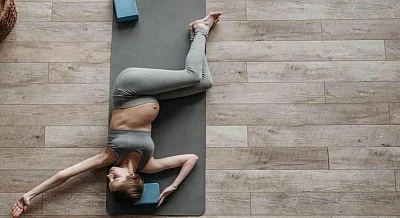Exercise and yoga have been considered great for a woman’s mental and physical health during pregnancy, and they may also result in a more active and healthy baby.
According to United States National Institutes of Health, around 150 minutes of moderate-intensity physical activity can be beneficial for pregnant women.
An exercise or yoga slot does not need to be for long hours to feel better and see the results. Women can exercise five times a week for 30 minutes or 10 times a week for 15 minutes. The key is to stay consistent.
Now, women who used to work regularly before their pregnancy can continue doing so but women who never practised yoga and wish to try it for the first time must consult their doctors and take it slow. Here are five yoga poses that have proven beneficial for easy labour and delivery.
1. Child's Pose
The child's pose may be helpful for your hips and back, relaxing them and allowing them to stretch. In this pose, you will have to kneel and sit on your knees.
Lean forward while keeping your buttocks on your heels, and rest your forehead on the floor. Place your arms next to your legs, palms facing up. Try to inhale and exhale slowly and deeply. Complete at least eight breaths.
If you find it difficult to rest your forehead on the floor, give this a try. Kneel and sit on your knees with your knees slightly apart. Lean forward and fold your arms in front of you on the floor. Now rest your forehead on your arms and continue inhaling and exhaling.
2. Half Squat
Half squats work on the quadriceps, hamstrings, glutes, hip flexors, calves, and core muscles, including those in the lower back.
Half squat can be practised this way:
Come on your hands and knees. Try to straighten the right knee and bring your right foot off the side such that it's in line with your right hip. Now turn your right toes out slightly.
While exhaling, slowly bend your right knee and extend your hands to the right until you are in a half squat position. Hold the pose. And follow your breath as you move from the half squat back to the centr. You can take a pause whenever you are inclined to an extra breath. Repeat it at least 10-15 times.
3. Deep Squat
The deep squat is just an advanced variation of the half squat. It will help open your hips and pelvis, locating and relaxing the pelvic floor muscles. It may also relieve the lower back pain and make you feel grounded.
Follow these steps to practise the pose:
Stand with your feet slightly wider than hip-width apart. Turn your feet out a little, maybe 45 degrees. Now bend your knees and sit your hips back and down as far as you feel comfortable. Now continue to squat as low and deep as you can go.
Your elbows should be inside your knees and your hands in a prayer position. Press your elbows out against your legs and lift your chest up toward your thumbs. You can narrow or broaden your stance and turn your toes in or out as needed. Make sure your knees are pointing in the same direction as your toes.
4. Tabletop Pose
Take the position on the floor on your hands and knees. Place your knees hip width apart and your feet directly behind the knees. Place the palms directly under the shoulders and your fingers should place be placed forward.
Look down and allow the back to be flat. Press into the palms and drop to the shoulders slightly away from the ears. Press the tail bone towards the back wall and your crown of the head towards the front wall to lengthen the spine.
Breathe deeply and hold the pose for 1-3 breaths. The table pose is the starting point for many floor postures that help lengthen and realign the spine.
5. Pigeon Pose
The pigeon pose helps the thigh and hips to stretch and can be practised to cool down after strengthening poses. Pregnant women require to release tension from their hips and lower back for easy delivery.
Make sure you have warmed up the body to create more ease and to go deeper. Here are the steps:
Come on all fours. Now stretch one leg back behind you. Bring the leg forward, between your hands while you bend your knee. Allow resting the leg behind the hand of that same side. Your back leg should be stretched out behind you. The knee and top of the foot should be on the floor.
Use your arm strength to balance at both sides and allow the body to prop you up while adjusting your hips at an equal level. If there is a height difference between the position of each hip, place a folded blanket under the bent hip. Keep your spine long, walk your hands out in front and fold over your front thigh. Sink into your hips to feel the deep stretch.
(At The Quint, we question everything. Play an active role in shaping our journalism by becoming a member today.)
